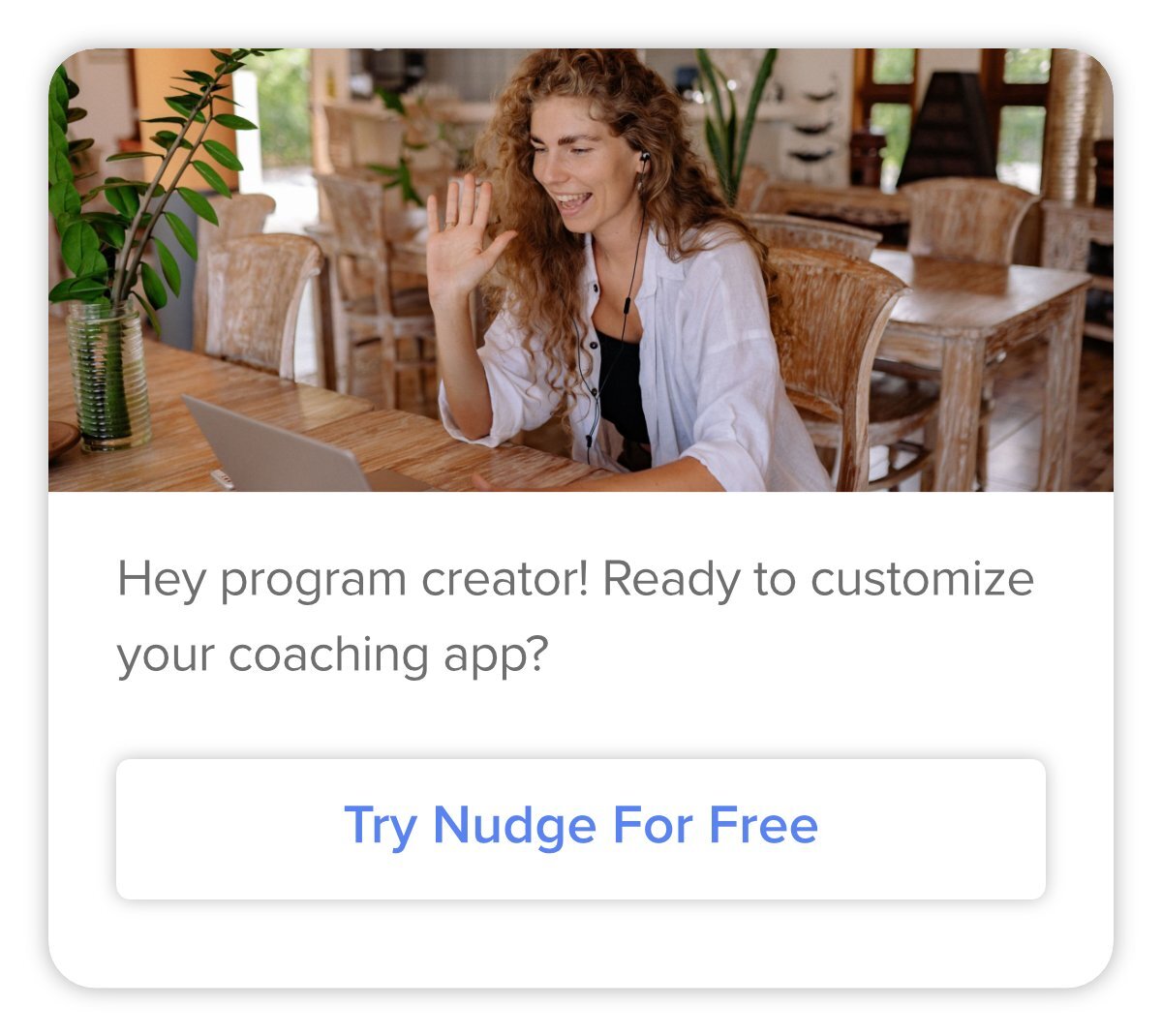How to identify and articulate your coaching offering, perform market research, and identify how much to charge for your health coaching services.
by
Mac Gambill
Co-Founder at Nudge Coach
Regardless of whether you are just launching your health coaching offering or looking to refine your coaching model, you need to be ready to answer specific questions from your prospects. Two of the most important being:
What your health coaching packages include?
How much do you charge for your online coaching program or package?
The goal of this discussion is to help you feel confident in the pricing model you develop for your health coaching services. These ideas hold true for nutrition coaching, nurse coaching, and other types of coaching as well.
There is a lot to consider but one of the most rudimentary concepts to understand is that of perceived value.
For instance, if you spend $10,000 putting together what you think is an incredible offering, and a person is only willing to spend $100 on it, then the perceived value by the market is far less for your product and it’s probably not worth pursuing.
This applies to any business and your health coaching services are no exception.
Define Your Offering & Concisely Articulate It For Market Research
In a recent post, I mentioned the critical first step is to identify what services will go into your offering, but it’s also important that you are able to boil it down to several concise points that you can articulate to others. i.e...
This is the problem I will solve by providing these services at this cost.
Before we could launch our health coaching software I had to try and concisely summarize our company’s purpose so that I could begin getting the necessary feedback from industry pros. I needed to know whether this was a valid concept and if people would even want to pay for it.
It now seems like a pretty simple concept, but it took countless conversations to hone in on what exactly we were going to build and offer our customers.
Are you creating a digital coaching business or depending on many face-to-face meetings? Each health coaching business is different and you need to first identify your niche and the time required to dedicate per client before you can assign appropriate value.
If your program isn’t defined yet, this post will help you start creating your next coaching program from scratch.
So, how much does a health coach make per hour? Health coach, Megan Lyons, adds that it's important to also consider the ancillary tasks and services that make up your offering - everything takes time and has an associated cost... everything.
“I was sure to calculate the number of hours I spend with clients (not only the in-person or phone session, but also all of the follow-ups between sessions, preparing, and writing detailed follow-up emails). Many health coaches miss this, and just price hourly for the time spent with clients.”
A Simple Google Search To See What’s Out There
A simple Google search is generally the easiest place to start to gauge what's already out there. If you google search keyword phrases like "health coaching prices" or "health coach prices" you can begin to see that there are plenty of health coaches online providing varying degrees of service.
After a quick scan of several sites, I was able to get a rough idea for both HOW health coaches generally charge, and for WHAT amounts - a few results from my searches are below as a reference - but I now know a typical coach charges between $200-500/month with some type of preliminary consult to "hook" the prospect.
Let’s look at some health coaching package examples.
Coach 1: $99 for upfront consult + $199/month
Coach 2: $50-120/week depending on offering = $200-480/month
Coach 3: $300/month with a 6 month commitment
Our friend Kathleen Legrys at Health Coach Solutions also was a top result from my "health coach prices" google search and here are a few typical health coaching services and fees structures she cites on pricing for one-on-one coaching:
Most coaches offer two sessions per month, and the session time ranges from 45 – 60 minutes.
New coaches that are just starting out charge around $50 – $75 per session.
More experienced coaches charge $100 – $200 per session.
There are also coaches that charge by the package ($1,200 – $2,400) so there is quite a range.
The more niche your market is, the more you can charge because the you’re providing a very specific solution.
Bonus Content
We collaborated with Kathleen on a follow-up post on pricing your coaching packages.
The ATM Coaching Formula (A Foolproof Way to Structure Your Programs for Scale)
We can use all of this data as a starting point and assume that these models are (somewhat) market tested, giving us a basic understanding of what a client MAY be willing to pay for health coaching services.
It's worth noting that coaches, like Megan Lyons, always recommend promoting long term commitments providing you with sufficient time to prove value.
“I have 2, 3, and 6 month programs, since I see the best results when guiding the client through a longer-term transformation, rather than just a week or a single session.”
Price sensitivity is also something to consider, but at the end of the day it all comes down to target audience and value provided.
With that said, if all coaches charge roughly $250/month and you swoop into the market at $75/month thinking you will undercut the other coaches, consumers will likely question your value and experience - not an ideal scenario.
Leverage Market Pros For Insights On Pricing & Ideal Client
Once we were able to concisely articulate what we were building with Nudge Coach it was time to ask industry professionals what THEY thought about our coaching platform - the more conversations the better. It’s worth pointing out that there is a real difference between asking someone if they think something is a good idea vs. if they would be willing to pay for it (and what amount).
“Good idea?”
yes/no question in which a person can simply say “yes” to provide an answer to avoid providing you any additional feedback. Not very helpful...
“How willing would you be to pay?”
This allows you to better understand the perceived value from an intelligent source in your market. Is this your ideal client? No, but this is hopefully a person who is familiar with the space, knows of comparable coaching models, and more importantly what your customer may be will to pay.
I strongly recommend trying to get feedback from as many credible professionals as possible who will provide you critical feedback on your offering and share insights on what they think a customer would pay.
Leverage Online Tools!
After speaking with some industry experts I remember thinking that we may be on to something, but I wanted more data points before we decided to jump all-in with our business. I encourage you to do the same.
Luckily there are countless online tools to survey groups of people (focused or random) that are great, cost-effective ways to gather additional feedback.
For instance, if you have several targeted questions you want to ask your contacts - such as “Would you feel comfortable paying for remote coaching? (i.e. phone and skype consults only)” - or - “How often would you want to speak with your coach each week?” - I’d fire up a campaign on SurveyMonkey, which allows you to send simple surveys to a set group.
Instead, we opted to run a campaign with Google Survey because we wanted to poll a larger population of health minded professionals outside our network for objective feedback.
We asked professionals if they would be willing to pay for a solution like ours, and more importantly, we structured the response to be a meter on their willingness to pay (1-10, with 10 being the most willing).
At first glance you can see that answers were all over the map, but we were relieved to see that the "10" was the clear winner.
While the average was a 5.8, the results were very polarized by age, and the younger demographics (up to about 40 years of age) were VERY willing to pay for a solution like this - ok, maybe our crazy idea wasn't so crazy :)
At the time, this was a simple $100 test that allowed us to get some great, additional data.
Bonus Content
Free access to watch over 50 live Office Hours sessions on a variety of coaching business topics with Nudge experts.
Start With A Low Barrier To Get Early Clients
Naturally, businesses require hard work and constant evaluation and iteration. Keep this in mind as you look at your pricing model, and don’t be afraid to give a discount in order to build up your client list. In my initial google search I encountered several coaches offering free consults, lower cost programs, or crediting cost towards sign up.
Don't be afraid to cut your margins on your first clients.
The early experience is critical as you learn to better articulate your value proposition and how you present yourself. Holli Thompson, a leading health coach and coach mentor is adamant doing whatever it takes to get your first "yes".
“When you’re starting out as a coach, the most important thing is to get clients. You want to work with as many as possible...It’s important to establish a price in the beginning that will allow you to do that. It might be half or a third of what you plan to eventually charge, but find the number initially that is easy to say ‘yes’ to.”
Price Influences Quality of Clients, So Work Your Way Up
Yes, having a higher price might exclude part of the market, but it may generate the RIGHT type of clients you are looking for: the ones that appreciate your value and are more likely to stick around.
For instance, a health coach friend and I were recently discussing his model and he mentioned that at one point he had a client, also a savvy businessman, mention that my friend needed to raise his coaching prices because his offering was so outstanding.
He was reluctant for obvious reasons, but after careful consideration this coach decided to raise his prices and as a result... he lost 0 clients. Why?
Because the perceived value of his offering by his customers was still far higher than the amount this coach was charging. Provide exceptional service (which doesn’t have to mean working more or working harder) and clients will stick around, be willing to pay more, and refer you to their friends.
While it can be an uneasy process, Holli recommends raising your rates gradually over time as your business begins to attract referrals and renewals.
“After you’ve built your roster of clients, and they begin to refer friends and you grow, plan to periodically raise your rates. It might be after 6 months or a year. And then you will want to evaluate it biannually until you reach the place you’re comfortable with.”
Identifying how much to charge as a health coach is a tedious task that takes careful research and well structured conversations. Leverage your contacts and the available online tools to get started, but be prepared to iterate as you grow over time.
Any other strategies we missed? Let us know and we can try to cover it in another post!
Special thanks to Holli Thompson and Megan Lyons for their valuable input on this article.
Holli Thompson is a leading health coach seen in outlets, such as NBC and FOX, as well as a mentor to health coaches where she helps coaches create action plans to launch businesses geared towards their ideal clients. See her list of coach mentoring services HERE.
Megan Lyons is a health coach and the owner of The Lyons’ Share Wellness.






